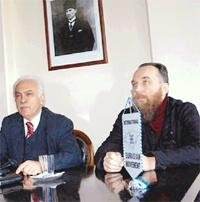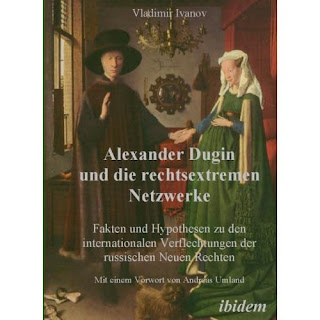By Joshua Buckley, editor,
TYR
In a recently published article, “The Euro-Pagan Scene: Between Paganism and Radical Right," (Journal for the Study of Radicalism, 2007), Stéphane François deals with a phenomenon that has only rarely been analyzed by outsiders – especially in the Anglophone world: what he calls “Euro-Paganism.” Covering a dizzying array of controversial music groups representing a wide-range of counter-cultural expression, the article makes for fascinating reading. The problem is that the sheer diversity and ambiguity of the material presented defies the author’s attempts to fit it into a meaningful framework. Unfortunately, it also suffers from some considerable shortcomings.
It is extremely difficult for a non-participant to write about youth subcultures. Unlike more conventional political or religious groupings, these subcultures do not present the researcher with much useful textual evidence. The subculture is expressed primarily through music and fashion, both of which are open to myriad interpretations. On the basis of my own experience of such subcultures, I would contend that the majority of participants in these subcultures are largely attracted by music and fashion, and that any ideological component is strictly secondary–even in the case of explicitly political subcultures (e.g. Nazi skinheads or anarchist punks). When ideological positions are expressed, there may be little concern that these positions are consistent or coherent, and one must always question the extent to which they reflect real convictions. More often than not, they may be motivated by considerations of style.
François’s article finds a subculture where, it could be argued, none exists. He identifies certain tendencies (pagan, revolutionary conservative, ecological) which he sees present to varying degrees in the work of music groups identified as part of the “Euro-pagan” scene. While it is certainly the case that some of these tendencies are apparent in some of the groups discussed, it is far less certain that these groups collectively represent anything like a cohesive “movement”–Euro-pagan or otherwise. In attempting to construct a history of the Euro-pagan scene, to define it as a more or less monolithic entity, and to trace the origins of a Euro-pagan ideology, François runs into problems of chronology, categorization, and the flow of influence. He also makes some factual errors. More importantly, it may be a project doomed to failure, especially if–as I would argue–no such “scene” really exists.
One would expect that a music-based subculture would consist of music groups with an identifiably similar sound. This is certainly the criterion for defining music genres like bluegrass, rhythm & blues, or country/western. Yet the vast majority of groups François refers to play wildly divergent styles of music. He describes the groups NON and Changes as precursors of the scene, yet anyone who has heard their music would be hard-pressed to identify any similarities. While Changes played lilting, lyrically poetic folk music akin to, say, Cat Stevens, NON is famous for helping develop power electronics or noise music. NON’s sound is visceral, atonal, and (often) brutal. Such music would have come as quite a shock to the crowds that once gathered to hear Changes play for packed coffeehouses and art galleries in the early- to mid-1970s.
Of course, one might argue that the groups François discusses are bound together by a common worldview or aesthetic. If the various tendencies he elucidates were all present in all of the groups mentioned, he might make a convincing case. However, many of the groups in the article display only one or two affinities–and often only in the most superficial sense. As an example, François describes the Slovenian outfit Laibach as “one of the first Euro-pagan groups.” To my knowledge at least, Laibach have never made reference to paganism at all. According to François’s definition, however, it is Laibach’s utilization of Fascist and other totalitarian imagery that qualifies them for inclusion in the subculture. But besides having nothing to do with paganism, Laibach’s Fascist style has nothing to do with Fascism. It is, rather, part of a larger strategy of post-modern cultural redirection, described at length in Alexei Monroe’s 2005 book Interrogation Machine (MIT Press). François insists that his analysis of Euro-pagan music reveals “the consistency of the message.” Yet one wonders how a subculture which apparently incorporates nostalgia for antiquity with the hyper-modernism of Italian Futurism, and a polytheistic, pagan worldview with the atheistic individualism of the Church of Satan, can be described as “consistent.” What we are really dealing with are multiple subcultures, or groups and individuals that defy categorization–like the aforementioned Laibach.
François sometimes mistakes similarities between groups or ideas for proof that these groups or ideas have had a direct influence on one another. As mentioned above, the group Changes existed in the early- to mid-1970s in the United States. They never released an album during that time, and they disbanded before many of the musicians François discusses were even born. It is true that Changes has since been rediscovered by fans of neofolk music (and have now reformed), and that the group has distinct similarities to some of the bands in François’s article. However, it is virtually impossible that the first incarnation of Changes actually influenced these groups, who could scarcely have discovered Changes’ work until the late-1990s. Even more problematic is François’s discussion of the European (mainly French) New Right. ENR thinkers like Alain de Benoist do have a relatively cohesive ideology that incorporates the pagan, revolutionary conservative, and ecological tendencies François equates with Euro-pagan music. However, while these themes are sometimes present in some of the music under consideration, they are not exclusively so. Moreover, relying on New Right texts to interpret a musical subculture arguably unconnected with the New Right is risky. It is like trying to understand Madonna’s music in terms of Catholic theology, since the singer sometimes wears a crucifix and calls herself “Madonna.” As with the music of Changes, it is unlikely that the first wave of bands François describes (who were mainly English) could have been exposed to New Right texts written mainly in French, and published in scholarly periodicals. Admittedly, some of these texts have been translated in the journal TYR (which I co-edit) but this has only occurred in the last few years. And despite the fact that the journal may appeal to fans of neofolk and other purportedly Euro-pagan music, it can hardly be said to speak for any particular subculture (especially one based primarily on music and fashion). Additionally, if TYR has influenced the development of a Euro-pagan scene, such influence would have to have been retroactive–since almost all of the groups in the article existed before the journal ever appeared.
Certainly, there are various music groups influenced by paganism (who might justly be described as “Euro-pagan”), just as there are music groups influenced by their flirtation with Fascism, an interest in Traditionalism, ecology, the Church of Satan, or the Italian Futurism of F. T. Marinetti. These groups, however, cannot be lumped together and characterized by a “consistent message”–especially when the author must derive that “message” from sources outside the supposed subculture itself. These groups play a variety of music, from folk, to power electronics, to neo-classical, to heavy metal. Many also utilize themes François never mentions, from an interest in psychedelic drugs to deviant sexuality. Some have real political convictions, others are apolitical. The majority use political or historical or religious or occult imagery for purely aesthetic reasons. What all of the groups François mentions have in common is that some of the imagery they use defies the Left/liberal consensus view of what is acceptable, and is therefore troubling for outsiders. François is undoubtedly correct when he describes these fascinations as a sort of “black romanticism”–not unlike the Goth subculture’s antinomian embrace of the macabre. In fact, the influential Goth magazine Propaganda was infamous for its frequent use of Nazi imagery, which jostled for place amongst a more pervasive interest in vampires and the editors’ pronounced homoeroticism. At a certain point, though, trying to explain such things as an “identitarian” response to “globalization and immigration” (except, perhaps, in very specific cases) raises serious questions of credibility.













